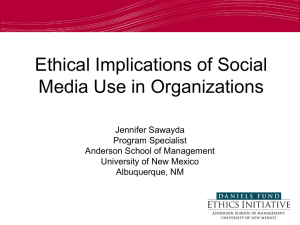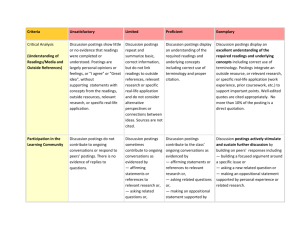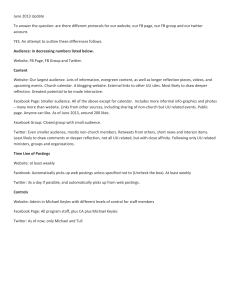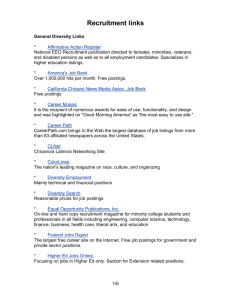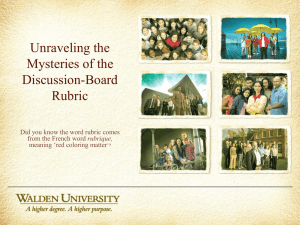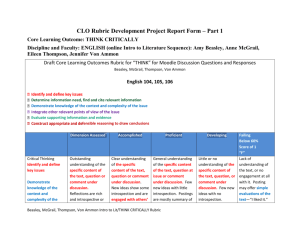Word
advertisement
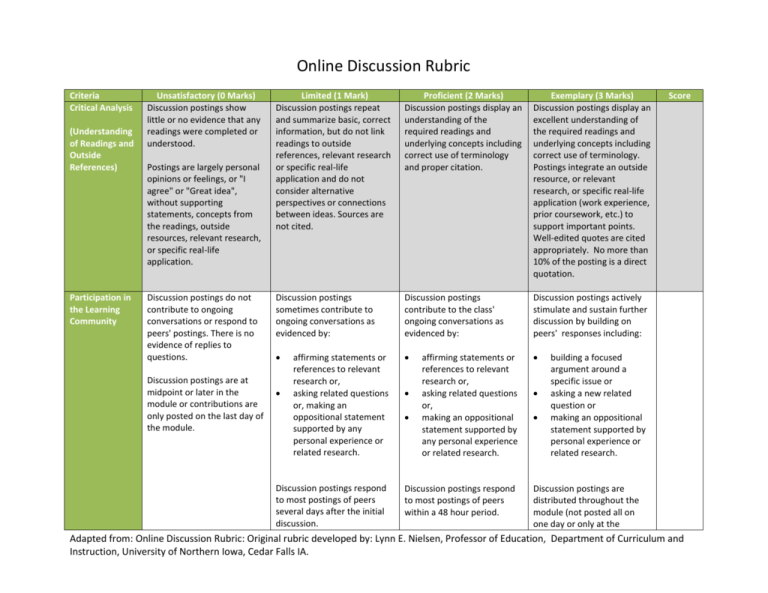
Online Discussion Rubric Criteria Critical Analysis (Understanding of Readings and Outside References) Participation in the Learning Community Unsatisfactory (0 Marks) Discussion postings show little or no evidence that any readings were completed or understood. Postings are largely personal opinions or feelings, or "I agree" or "Great idea", without supporting statements, concepts from the readings, outside resources, relevant research, or specific real-life application. Discussion postings do not contribute to ongoing conversations or respond to peers' postings. There is no evidence of replies to questions. Discussion postings are at midpoint or later in the module or contributions are only posted on the last day of the module. Limited (1 Mark) Discussion postings repeat and summarize basic, correct information, but do not link readings to outside references, relevant research or specific real-life application and do not consider alternative perspectives or connections between ideas. Sources are not cited. Proficient (2 Marks) Discussion postings display an understanding of the required readings and underlying concepts including correct use of terminology and proper citation. Exemplary (3 Marks) Discussion postings display an excellent understanding of the required readings and underlying concepts including correct use of terminology. Postings integrate an outside resource, or relevant research, or specific real-life application (work experience, prior coursework, etc.) to support important points. Well-edited quotes are cited appropriately. No more than 10% of the posting is a direct quotation. Discussion postings sometimes contribute to ongoing conversations as evidenced by: Discussion postings contribute to the class' ongoing conversations as evidenced by: Discussion postings actively stimulate and sustain further discussion by building on peers' responses including: affirming statements or references to relevant research or, asking related questions or, making an oppositional statement supported by any personal experience or related research. Discussion postings respond to most postings of peers several days after the initial discussion. affirming statements or references to relevant research or, asking related questions or, making an oppositional statement supported by any personal experience or related research. Discussion postings respond to most postings of peers within a 48 hour period. Score building a focused argument around a specific issue or asking a new related question or making an oppositional statement supported by personal experience or related research. Discussion postings are distributed throughout the module (not posted all on one day or only at the Adapted from: Online Discussion Rubric: Original rubric developed by: Lynn E. Nielsen, Professor of Education, Department of Curriculum and Instruction, University of Northern Iowa, Cedar Falls IA. Etiquette in Dialogue with Peers Written interactions on the discussion board show disrespect for the viewpoints of others. Some of the written interactions on the discussion board show respect and interest in the viewpoints of others. Written interactions on the discussion board show respect and interest in the viewpoints of others. Quality of Writing and Proofreading Written responses contain numerous grammatical, spelling or punctuation errors. The style of writing does not facilitate effective communication. Written responses include some grammatical, spelling or punctuation errors that distract the reader. Written responses are largely free of grammatical, spelling or punctuation errors. The style of writing generally facilitates communication. beginning or only on the last day of the module). Written interactions on the discussion board show respect and sensitivity to peers' gender, cultural and linguistic background, sexual orientation, political and religious beliefs. Written responses are free of grammatical, spelling or punctuation errors. The style of writing facilitates communication. Comments Note: Open class discussion is an important and significant part of an online course. While class discussion whether online or face to face, can be characterized by free flowing conversation, there are identifiable characteristics that distinguish exemplary contributions to class discussion from those of lesser quality. The criteria found on the rubric above will be used to assess the quality of your initial postings and responses to the postings and comments of peers during class discussion. Note: Initial postings are your comments based on the discussion prompt posted by the instructor. Responses to others are your replies to your peers' initial postings. Adapted from: Online Discussion Rubric: Original rubric developed by: Lynn E. Nielsen, Professor of Education, Department of Curriculum and Instruction, University of Northern Iowa, Cedar Falls IA.
